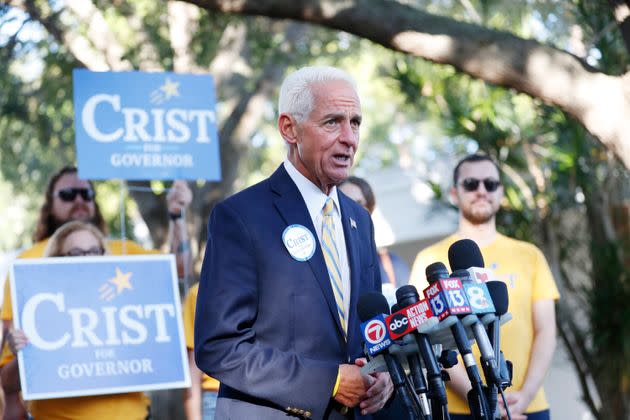Charlie Crist Wins Chance To Take On Florida Gov. Ron DeSantis And His $132 Million
- Oops!Something went wrong.Please try again later.
- Oops!Something went wrong.Please try again later.
Charlie Crist on Tuesday won the Democratic nomination for Florida governor, giving him a second shot at the job he once held as a Republican.
Crist easily defeated Nikki Fried, the sitting agriculture commissioner and currently the only Democrat in a statewide office, which now allows him to take on incumbent Gov. Ron DeSantis. The Florida Republican has spent recent months campaigning around the country as a prelude to a widely expected 2024 presidential run.

Florida gubernatorial candidate Rep. Charlie Crist speaks to the media before casting his vote in the primary election on Aug. 23, 2022. (Photo: Octavio Jones via Getty Images)
Crist focused on that in the eight-minute victory speech he gave just 17 minutes after polls closed in the state’s Panhandle counties located in the Central time zone. “This guy wants to be president of the United States, and everybody knows it. However, when we defeat him on Nov. 8, that show is over,” he said to cheers. “Gov. DeSantis only cares about the White House. He doesn’t care about your house.”
Fried, who for much of the year-and-a-half primary campaign had lagged far behind in polling, seemed to gain momentum in recent weeks thanks to a surge of women voters angered by the U.S. Supreme Court striking down Roe v. Wade.
That boost, though, proved ephemeral, as Democratic voters appeared to make a pragmatic decision about who would be best able to defeat DeSantis: Fried, who appealed the most to young and progressive voters, or Crist, preferred by older and more moderate Floridians.
Crist won most of the state’s large metro areas by two-to-one margins, including in Broward County, Fried’s home base, and late Tuesday led statewide 60% to 35%.
Four years earlier, Democrats picked the progressives’ favorite, Andrew Gillum, over the more moderate Gwen Graham, only to see him lose narrowly to DeSantis in a strong year for Democrats.
In his remarks Tuesday, Crist repeated a theme he hit often in the primary campaign: that he can create a coalition of voters, including moderate Republicans, who are turned off by DeSantis’ aggressive style.
“We can unite Democrats, independents, and many Republicans who care about our Florida, and we will defeat Ron DeSantis,” he said.
As he attempts to do this, though, Crist faces a steep climb.
No sitting governor has lost reelection in Florida since 1990, and that only happened because Republican Bob Martinez was challenged by the immensely popular Lawton Chiles, who had already served three terms in the U.S. Senate.
Crist also faces a staggering financial disadvantage heading into the general election just two and a half months away. Florida campaign finance records show that between his campaign and his political committee, Crist had just $1.5 million available to spend on Aug. 18, the close of the final pre-primary filing period, after having raised and spent a total of $15.2 million to defeat Fried.
In contrast, DeSantis, who had no primary challenger, has a total of $132 million available to spend and is likely to raise many tens of millions more in the coming weeks.
Whether Democrats in Florida and around the country will be willing to spend heavily on a long-shot race remains to be seen, particularly with winnable governor’s races on the line in states like Wisconsin, Pennsylvania and Arizona.
For Crist, meanwhile, Tuesday’s win allows him a chance to end a losing streak of two statewide defeats in a row, starting with his failed U.S. Senate run in 2010, first as a Republican, then as an independent. He then lost a close race in 2014 as a Democrat trying to win back the governor’s mansion that he had occupied from 2007-2011 as a Republican.
Previously, in statewide races as a Republican, he lost a bid for U.S. Senate in 1998, won the education commissioner’s job in 2000, and was elected state attorney general in 2002. He is currently a third-term Democratic congressman representing the St. Petersburg area.
This article originally appeared on HuffPost and has been updated.
